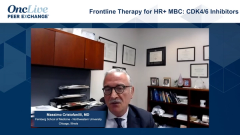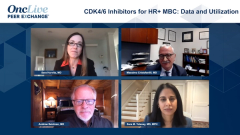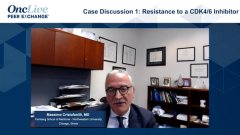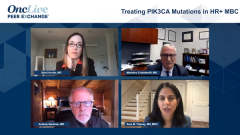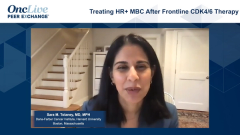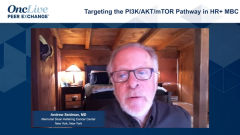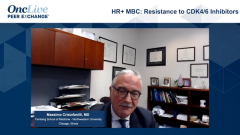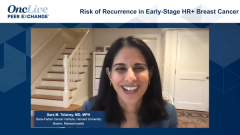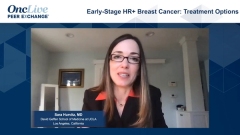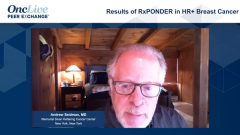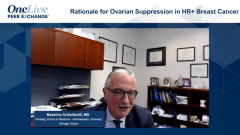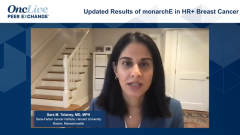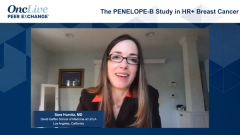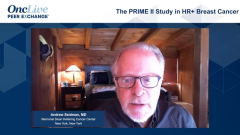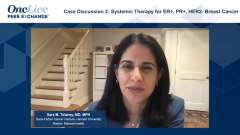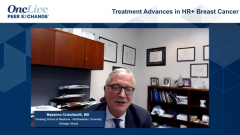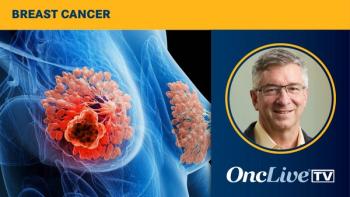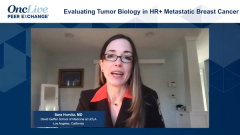
Targeting the PI3K/AKT/mTOR Pathway in HR+ MBC
Episodes in this series

Sara Hurvitz, MD: I want to turn to a related topic but a bit of a different direction and talk about other therapies and approaches to targeting the PI3 kinase pathway that are emerging. Andrew, can you take us through some of the newer data, perhaps some data relating to capivasertib and other types of inhibitors like this, including ipatasertib, where we’ve had some negative data?
Andrew Seidman, MD: For hormone receptor-positive, HER2-negative breast cancer, PIK3CA/AKT/mTOR is a frequently altered pathway and is often a key driver, so it’s natural to look at all components of this pathway. Of course, mTOR was the first that led to the clinical use of everolimus going back now almost a decade, and then PI3 kinase. The FAKTION trial, which was reported not that long ago, compared the use of fulvestrant plus placebo to fulvestrant plus capivasertib. And here there was a PFS [progression-free survival] advantage of about 5 to 10 months, favoring the use of capivasertib. This was a significant result, and the CAPItello trial, which is a phase 3 study, is ongoing to confirm that. Capivasertib is a potent selective oral inhibitor of all 3 isoforms of the serine/threonine kinase AKT.
Unfortunately, AKT mutations are not very common, so we’ll have to see how big a piece of the breast cancer pie this ultimately impacts. Ipatasertib is another AKT inhibitor also being studied, and whether these agents will work best in combination with endocrine therapy or chemotherapy in triple-negative breast cancer is another unanswered question. There are many other drivers in that heterogeneous group of patients who are triple negative, and I think ongoing studies will have to inform us about that.
Sara Hurvitz, MD: I remember when everolimus first came out, there was a steep learning curve in managing toxicity with stomatitis, and now we’re using steroid mouthwash to help us mitigate these adverse effects. I feel really comfortable using everolimus. In the beginning I did not, but now I feel it’s like capecitabine, it’s fairly easy to manage. What have you experienced, Andrew, in the treatment of patients with alpelisib? What are the challenges you’re facing, and are you beginning to get to the top of that learning curve? How do you think clinicians are managing the unique toxicities associated with this particular inhibitor?
Andrew Seidman, MD: You’re absolutely right. The emerging toxicities from inhibiting this pathway have required us to be better internists. So going back to mTOR, having to relearn how to manage hyperglycemia and hyperlipidemia. For alpelisib, skin reactions are also important. The proactive use of antihistamines, of corticosteroids topically, is important. I work at an institution where we have an excellent support team in terms of dermatologists who are well versed in managing cutaneous toxicity of cytotoxic agents. I guess that would be the other new issue. When cutaneous toxicity does occur from alpelisib, it can be a deal-breaker for many patients.
Sara Hurvitz, MD: Yes, absolutely. I think Hope Rugo, MD, presented some data regarding the use of upfront antihistamine. We’re now using that as routine as well. It’s funny, I had a very slender patient who I started on alpelisib, who had the lowest risk for hyperglycemia, and came in with a glucose of 550 mg/dL, very frightening. We have to watch these patients closely and make sure that we have our eye on the ball, and not send them off and say we’ll see you in 3 or 4 weeks.
Andrew Seidman, MD: I would say metformin is my go-to agent, the one I feel most comfortable with. My repertoire doesn’t extend too far beyond that, and if I need to, I start to engage my endocrinologists.
Sara Hurvitz, MD: I agree completely.
Transcript Edited for Clarity


